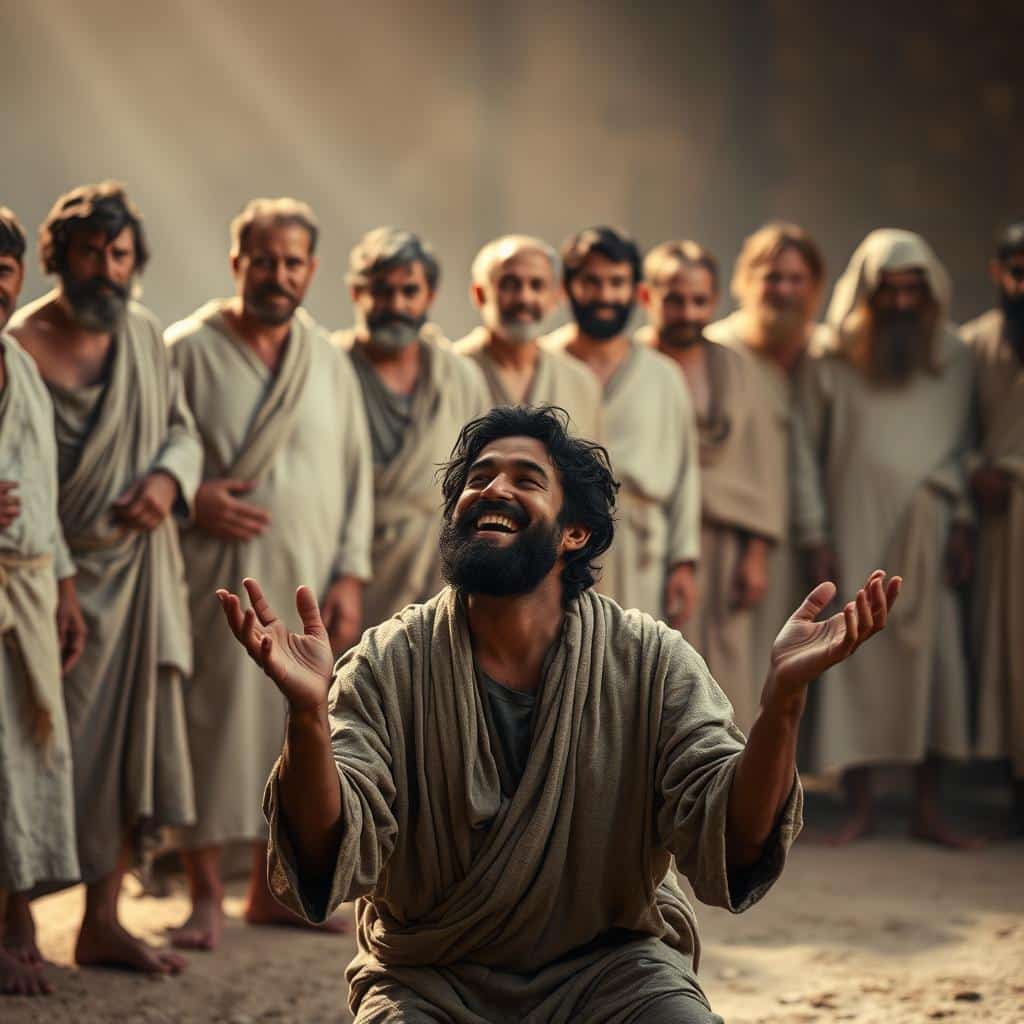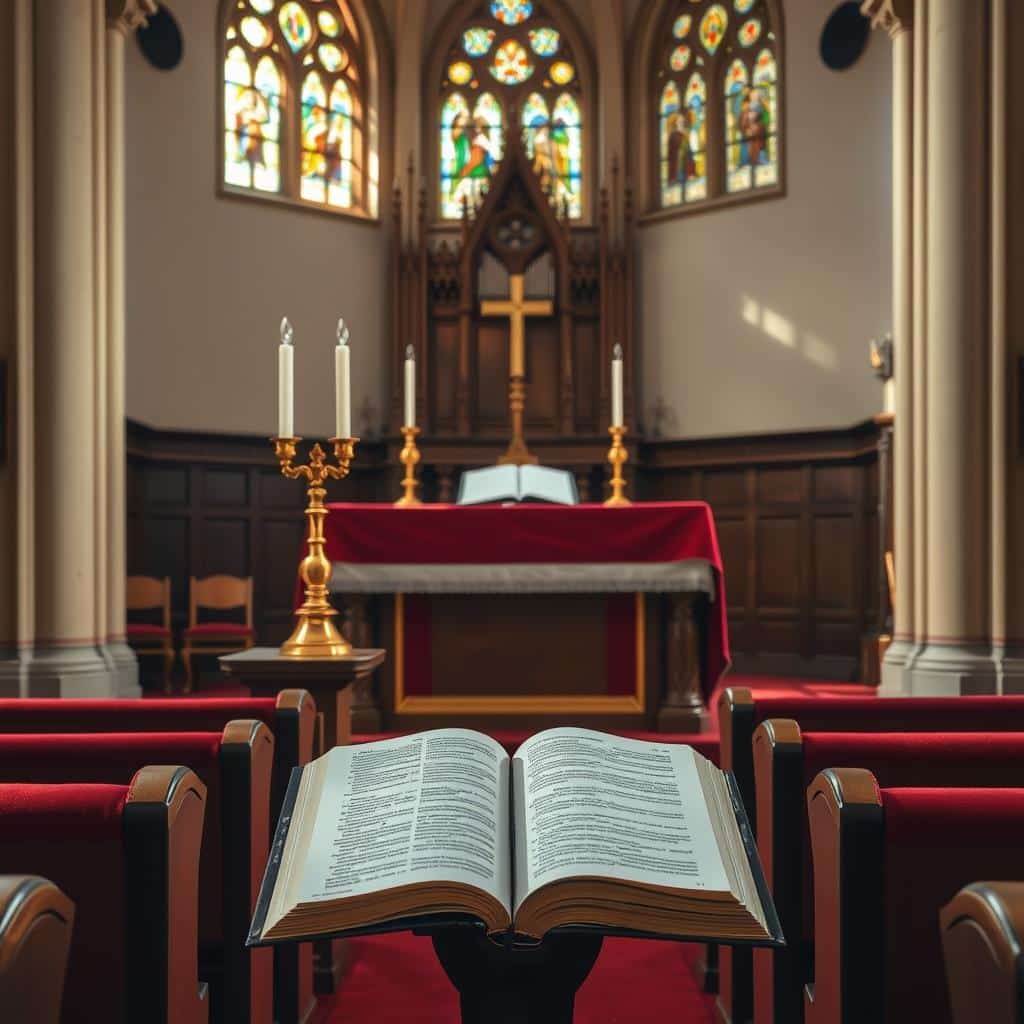Today we gather in faith to hear a Gospel and a Homily for the 28th Sunday in Ordinary Time, Cycle C that calls people to gratitude, healing, and mission.
Readings include Reading I 2 Kings 5:14-17, Responsorial Psalm Psalm 98:1,2-3,3-4, Reading II 2 Timothy 2:8-13, and Gospel Luke 17:11-19.
This brief homily points forward to how that Gospel will shape lives during liturgy and through the week.
Drawing on Father Denis J. Hanly’s Year C reflection and pastoral notes from St. Pius X, Soweto, we focus on gratitude as a lived disposition, not mere duty.
We will trace Naaman’s cleansing, the Psalm’s praise, Paul’s steadfast witness, and Jesus’ encounter with the healed leper who returns to give thanks.
Expect practical steps, a short faith moral story, and gentle religious humor to help the message land warmly for a U.S. congregation.
Key Takeaways
- Gratitude turns healing into worship and fuels mission.
- The four readings form a single call to faithful response.
- Ordinary time grounds steady discipleship in daily life.
- Practical steps will help families practice thanks this week.
- Stories and gentle humor make the Gospel accessible and memorable.
Setting the scene for Ordinary Time: gratitude at the heart of today’s liturgy
Today the readings call us to make gratitude a steady practice in ordinary life. In ordinary time the Church trains people to follow a faithful way, not only in great moments but in daily routines.
The Eucharist gathers us for praise and sends us back to life. Psalm 98 and Luke 17:11-19 link worship and thanks so that liturgy shapes how we see things. Gratitude turns burdens into gifts and duties into delight.
Drawn from Father Hanly and Soweto notes, this season invites a shift from a closed sandbox mindset to an open heart walking with Jesus toward the Father’s house. Simple habits—morning and evening thanks—help keep the heart supple all week.
- Practice: pause each day to say thank for small things.
- Posture: let worship shape work, and work return to worship.
- Promise: steady gratitude grows holiness in family and parish life.
“Gratitude changes the way we meet people and meet God.”
Today’s readings at a glance: 2 Kings 5:14-17; Psalm 98:1, 2-3, 3-4; 2 Timothy 2:8-13; Luke 17:11-19
These passages trace a path: healing that leads to thanksgiving and a mission that endures. Below is a concise guide to each reading and how they connect.
Reading I — 2 Kings 5:14-17: Naaman’s healing and a grateful heart
Naaman, a Syrian commander, washes in the Jordan and is cured. He returns to bless Israel’s God and asks for two mule-loads of earth to worship on holy ground.
Takeaway: humility and obedience open the way to gratitude, and worship can follow people across borders.
Responsorial Psalm — Psalm 98:1, 2-3, 3-4: “The Lord has done marvelous things”
Psalm 98 calls the assembly to a full-voiced response. The community is invited to sing because God has acted marvelously.

Reading II — 2 Timothy 2:8-13: “The word god is not chained”
Paul proclaims Christ raised from the dead and reminds readers that though he faces chains, the word god remains free.
Takeaway: the Church’s mission continues even amid hardship; perseverance matters.
Gospel — Luke 17:11-19: Ten lepers, one returning to give thanks
Jesus heals ten lepers who head to the priest, yet only one returns to praise God—a Samaritan. Jesus notes the missing nine with a sharp question.
Takeaway: true faith shows itself in grateful action that goes beyond mere observance of law.
- Naaman models humility, obedience, and gratitude.
- His request for Israel’s earth signals worship beyond familiar places.
- Psalm 98 calls the people to joyful, communal praise.
- Paul’s chains contrast with an unchained gospel that empowers mission.
- Luke 17:11 records ten lepers healed; one returns to thank God.
- All readings converge: God heals, the Church sings, and gratitude becomes witness.
Homily For the Twenty-eighth Sunday in Ordinary Time, Cycle C: the way of gratitude over mere duty
This short homily traces how grateful hearts turn routine obedience into joyful discipleship. The four readings together show healing that births praise and then sends people outward.
From duty to delight: a life that merely keeps the law can still miss the full life God offers. When gratitude leads, duty is fulfilled from the heart and work becomes worship.
Foreigners and outsiders often see mercy first. Naaman and the Samaritan model a prompt response to the good news. Their examples remind us that a foreigner can show us how to praise.
Father Hanly insists we are the lepers called to seek Jesus’ compassion and to journey home to the Father. The Soweto reflection adds that true thanks surpasses legal minimums and becomes missionary joy.

“Gratitude moves us beyond compliance into a way of life that witnesses to God’s mercy.”
- Examine your heart: do you follow rules or follow Jesus?
- Begin each day naming gifts and asking how to share them.
- Let gratitude shape habits so faith withstands hardship and even death.
Gospel focus: the ten lepers, the one grateful leper, and the joy that follows “thank you”
A simple act — turning back to say thanks — becomes the key moment in Luke 17:11-19. Ten men cry out to Jesus for mercy and are healed as they go to the priest for the law’s certification. Only one pauses to return and praise God.

“Weren’t there ten?” — hearing Jesus’ question today
Jesus’ question, “Weren’t there ten?” acts as an examination of conscience. It asks each person: how often do I receive grace and fail to give thanks?
“Say thank you”: the simple practice that opens the heart
The Gospel shows a repeatable habit. Call on Jesus, obey his word, notice healing on the way, and return to praise. Saying thank frees the heart from self-absorption and turns healing into witness.
Father Hanly’s insight: see that we are the lepers
Father Hanly reminds us that we stand among those healed people. We need mercy and must learn to thank. The foreigner who returned shows that grace crosses boundaries and makes one a living witness.
- Examine: did I notice blessings this week?
- Act: name one person to thank before the new week begins.
- Practice: a short weekly examen—where did I see grace and how did I respond?
“Gratitude breaks selfishness and opens us to healing.”
Reading I and II in dialogue with the Gospel: healed to worship, freed to witness
When healing moves beyond a single moment, it reshapes how a person lives and worships.
Naaman follows Elisha’s word, bathes in the Jordan, and returns not simply cleansed but transformed. He takes two mule-loads of Israel’s earth to make holy ground at home. That act models a man who turns gift into lasting worship among his people.

Naaman’s return: carrying holy ground home
Naaman’s thanksgiving shows that a cure must be made public and domestic. He worships beyond the moment and changes his household by bringing God’s presence into daily routines.
Paul’s promise: endure with Christ, live with Christ
Paul insists the word god cannot be chained. Even when messengers suffer, the good news travels. If we die with Christ, even death becomes passage to life in him.
“Healing that is not returned in thanks risks becoming only personal relief; true worship completes the miracle.”
- Naaman: healed, returns, and witnesses at home.
- Paul: the word remains free and calls us to endurance.
- Luke: the healed person goes to the priest but the grateful one goes further and praises God.
| Passage | Action | Outcome |
|---|---|---|
| 2 Kings 5:14-17 | Obedience to Elisha; bathes in Jordan | Gratitude; brings holy ground home |
| 2 Timothy 2:8-13 | Proclaims Christ despite chains | Endurance; word remains free |
| Luke 17:11-19 | Ten healed; one returns to praise | Worship completes witness |
Practice: after receiving grace, name the gift and share one short witness with a person you trust. Let obedience, gratitude, and mission form one steady way of faith.
Psalm and Eucharist: thanksgiving as the Church’s living response
Psalm 98 invites the gathered people to lift a song that names God’s marvelous deeds. This call links heaven’s praise to our daily life and shapes how we live during ordinary time.
Make a joyful noise: Psalm 98 and the Good News today
Psalm 98 trains the assembly to proclaim the good news in confident song. It prompts people to give thanks and to praise with joy.
When we sing, praise becomes public witness. The psalm turns private gratitude into a communal voice that carries the gospel and the word of hope.
Eucharist means thanksgiving: bringing our whole lives to the altar
The Eucharist literally names thanksgiving. At Mass we bring cares, hopes, and every small gift to be transformed.
Make a habit: before Mass, write a short list to give thanks god for specific graces and the people who support you. Let each communion be a renewed yes that deepens service during the week.

- Bring things that weigh on you and things that delight you to the altar.
- Adopt a home ritual: mealtime pause to say thank together.
- In sunday ordinary practice, steady praise helps the heart follow the way god sets before us.
| Element | Action | Result |
|---|---|---|
| Psalm 98 | Sing God’s marvelous deeds | Communal joy and witness |
| Eucharist | Bring life and cares to altar | Transformed gifts for service |
| Daily practice | Say thank, list graces | Steady gratitude and resilience |
Let Psalm 98’s voice become our own: a Church that sings, gives thanks, and sends people strengthened to love.
Faith Moral Story and lighthearted moments: teaching gratitude in everyday life
A quick story can show how a small habit turns fear into generosity.
Faith Moral Story: A child guards a sandbox crying, “my sandbox.” A parent teaches one small rule: before you take, say thank. The child tries it, then shares. Over time that habit frees play and builds trust among people in the park.
This simple scene shows how gratitude loosens fear and trains a person to see every gift as meant for society, not hoarded alone.

Religious jokes to support the message
- Ironside’s table-grace image: a man who never says grace is likened to a dog diving in—funny, but it nudges us to pause and say thanks.
- “The lectionary is like a GPS—you only get lost if you refuse the next turn; fortunately, ‘recalculating’ is grace.”
- “Some think the collection basket is a lasso; don’t worry, it’s just an invitation to let gratitude make the first move.”
- “If joy is missing, try a gratitude audit; side effects may include spontaneous smiles and unexpected patience.”
Reflection hook: in a society pressed for time, one brief grace daily trains the heart to notice today’s gift and the people who made it possible.
“Start a daily gratitude minute and let that small habit open new ways of relationship and service.”
| Moment | Practice | Result |
|---|---|---|
| Sandbox story | Say thank before sharing | Generosity and trust |
| Table grace | Pause to bless food | Awareness of gifts |
| Daily minute | Write one note of thanks | Gratitude ripples outward |
Conclusion
This conclusion draws together healing, praise, witness, and a daily habit of gratitude.
, We recall 2 Kings 5:14-17; Psalm 98:1,2-3,3-4; 2 Timothy 2:8-13; Luke 17:11-19 as a single call: receive mercy, give thanks, and go on mission.
Father Hanly’s line, the Soweto reflection, and Fr Munachi’s reminder that the word god is not chained urge a concrete response rooted in Eucharistic worship. The Faith Moral Story and light humor help habits stick: say thank, share gifts, and let gratitude shape law and life.
Practical resolve: name three gifts this week and give one away. Go with eyes open to grace, hearts ready to serve, and voices set to proclaim the good news.





